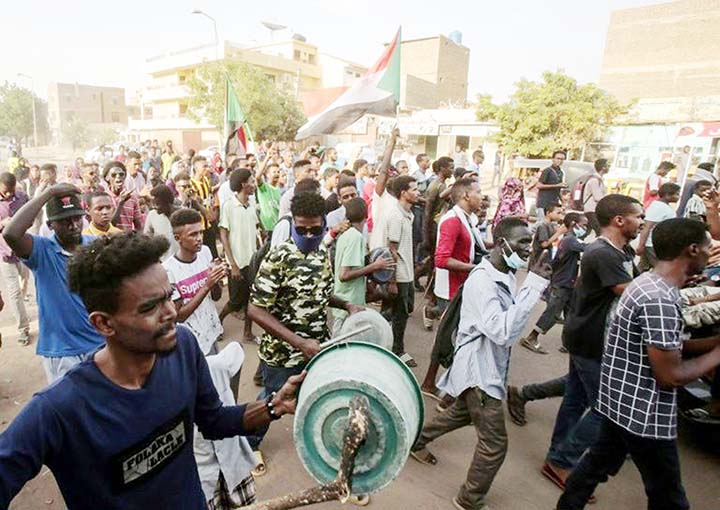
The Guardian :
Sudanese protest leaders have cancelled planned talks with the country’s ruling generals as they visited a town where at least five school children were shot dead on Monday.
The head of Sudan’s ruling military council had earlier said there must be immediate accountability over the shooting, state news agency SUNA reported, and the United Nations has called for an investigation into what protesters said was a “massacre.
The children died when security forces opened fire on a protest in El-Obeid in central Sudan. The oldest was 16, the youngest 14, locals said.
“There will be no negotiations today as we are still in El-Obeid,” Taha Osman, a negotiator from the protest movement told Agence France-Presse by telephone from the town.
Witnesses described how militia from the feared Rapid Support Forces (RSF) fired on teenagers, many of whom were wearing school uniforms and carrying school bags, as they marched peacefully in protest at shortages of water, electricity and public transport in El-Obeid, the capital of North Kordofan state. There were also reports of at least one adult casualty.
Rashid Mustafa, a relative of Abdulwahab Abdo, a 17-year-old who was shot dead, told the Guardian that the student sustained wounds to the stomach and kidneys.
“His younger brother chanted on a video that went viral on social media saying that, blood for blood, we won’t accept compensation,” Mustafa said.
The shooting was one of the bloodiest incidents in Sudan since the RSF killed more than 120 people at a protest site in Khartoum, the capital, last month. The government claims far fewer died in that attack.
The RSF are commanded by Mohammed Dagalo, known as Hemedti, who is seen as the most powerful of the military rulers in charge of Sudan since the ousting of President Omar al-Bashir in April.
The deaths on Monday prompted further protests in El-Obeid, where markets were shut, schools suspended and a curfew was imposed. Authorities announced a state of emergency in the state and shut down internet access. The army was deployed in the city.
There were also demonstrations in Khartoum, Omdurman and Port Sudan as news of the shooting spread.
The Central Committee of Sudanese Doctors, one of a group of unions and professional bodies that helped lead months of protests against Bashir, said many people were injured in the incident in El-Obeid.
There was no immediate statement from the state security services or from Sudan’s military leaders.
Opposition activists have kept up their demonstrations since April, pressing for the military to speed up the move to civilian rule and calling for justice for the people killed last month in Khartoum.
The shootings have been condemned by the United Nations and some international powers.
Abdullah Fadil, a Unicef representative in Sudan, said: “No child should be buried in their school uniform. The children, aged between 15 and 17 years old, were protesting the commencement of the school year amid the political uncertainty in Sudan …. Unicef calls on the government to investigate and hold all perpetrators of violence against children accountable.”
The main opposition Forces of Freedom and Change (FFC) coalition is negotiating with the ruling military council to finalise an agreement for a three-year transition to elections.
The two sides signed a deal on 17 July setting out the transition’s institutions. But talks have been repeatedly delayed since then owing to disagreement over the wording of a constitutional declaration to determine the role of a ruling council to govern Sudan.
A new round of talks is due to start on Tuesday. It will cover issues including the powers of the joint civilian-military governing body, the deployment of security forces and immunity for generals over protest-related violence.
The power-sharing deal already agreed provides for the establishment of a governing body of six civilians and five generals. It will oversee the formation of a transitional civilian government and parliament to rule for 39 months, after which elections will be held.
Siddiq Youssef, a senior leader of the Sudanese communist party, called for the FFC to halt negotiations until human rights violations by the military rulers had stopped.
The British embassy called for an independent investigation into Monday’s shooting. “Those responsible must be held to account,” it said.

